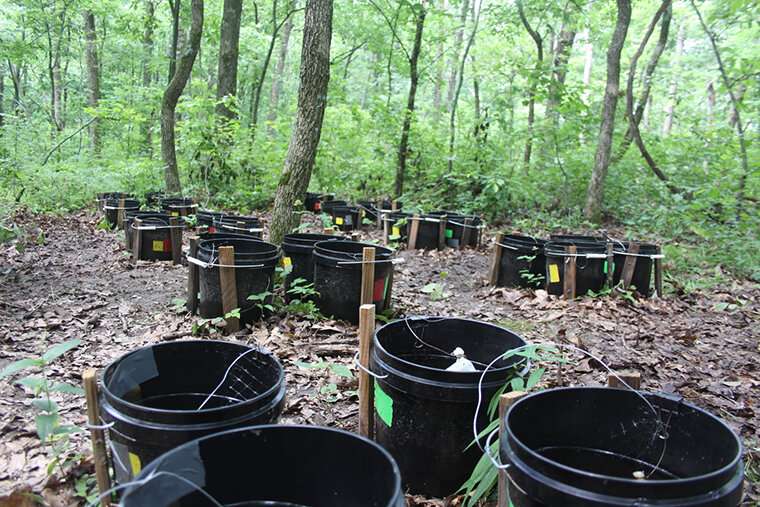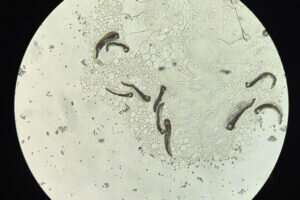A tale of two skeeters—biologists discover something positive about an invasive mosquito species

It's rare that scientists see the good in the presence of an invasive species. But Washington University in St. Louis researchers discovered that a native mosquito in Missouri has fewer parasites when it shares its waters with an interloper.
Scratching your head? Yes, mosquitoes have parasites. And yes, being parasitized is costly for an organism, no matter how much humans love to hate that organism.
"The extra energy put into fighting an infection, or lost to consumption by a parasite, can lead to changes in behavior in the host. That can change its ability to escape predation or compete for space and resources," said Katie M. Westby, postdoctoral research associate at Tyson Research Center and first author of a new study published in the Journal of Animal Ecology. "Thus, if an invasive species reduces parasitism in a species in a community, it may indirectly affect other members of the community."
Working at Tyson Research Center, the environmental field station for Washington University, researchers compared the parasite loads of members of the local eastern tree-hole mosquito species (Aedes triseriatus) with members of an invasive Asian rockpool mosquito species (Aedes japonicus), which has only been spotted in Missouri since 2005.
Both are what is called container-breeding mosquitoes, meaning that their eggs and larvae are commonly found in water-holding containers such as tires and buckets.

For this field experiment, researchers set up a mosquito nursery with 40 buckets of rainwater with varying levels of leaf debris. Three times a week, they sieved through some of the buckets of muck to remove the larvae of the invasive species that hatched. They left the others alone.
In the water, mosquito larvae encounter a kind of parasite called a gregarine parasite when the larvae are filter-feeding. But this parasite is species specific, which means that if it gets vacuumed up by the wrong kind of mosquito larvae, it can't complete its life cycle. And apparently that's exactly what's happening.
"We found the presence of the invasive rockpool mosquito significantly reduced parasite prevalence in the native tree-hole mosquito via a dilution effect," said Westby, who dissected the mosquito larvae to look for the parasites in their midguts.
When the native mosquitoes were sharing space with invasives, the natives were infected with parasites 13 percent to 27 percent of the time; when the natives were kept alone, they had parasites 72 percent to 90 percent of the time.

It's called "encounter reduction." Quite simply, if the invasive eats the parasite first, the native never runs into it.
Biologist Kim Medley, director of Tyson Research Center who also leads the center's mosquito research, noted: "Understanding the patterns and processes that manifest in infectious disease is fundamentally an ecological question – that is, it's about species interacting with one another and with their environment.
"In this case, invasion reduced infection by reducing encounters with parasites, but not by altering the abundance of the native species; rather, the mechanism was through removal of infectious particles from the habitat," she added.
"Studies like ours can broadly inform how infectious disease manifests and how it changes with changes in biodiversity. This concept can be applied to numerous systems, including infectious disease in humans," Medley said.
More information: Katie M. Westby et al. Invasive species reduces parasite prevalence and neutralizes negative environmental effects on parasitism in a native mosquito, Journal of Animal Ecology (2019). DOI: 10.1111/1365-2656.13004
Journal information: Journal of Animal Ecology
Provided by Washington University in St. Louis



















